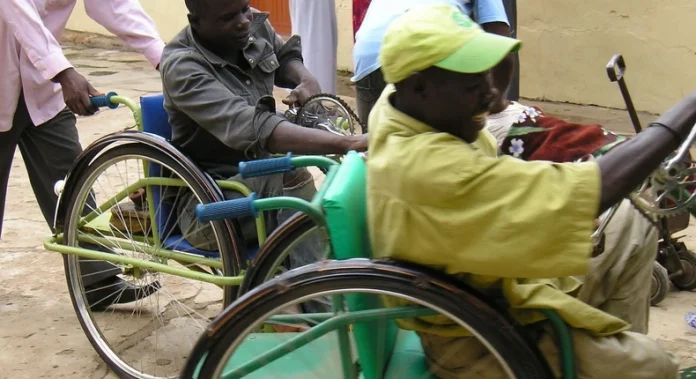by RAJI ADE OBA
Following 18 years of struggle, in January 2019, Nigerian President Mohammadu Buhari assented to a historical piece of legislation–Discrimination against Persons with Disabilities (Prohibition) Act 2018.
With the Act, discrimination of any form, shape, or size against any Nigerian with a disability is complete punishable criminality. National Disability Act is a key to the full reintegration of Nigerians with disabilities.
There are over 31 million people with disabilities in Nigeria. This makes Nigeria by far one of the largest nations with a significant number of people with disabilities worldwide.
This is due to the staggering population, geographical, material size, and the dynamism of our population in the face of protracted economic hardships, including safeguarding and institutional challenges particularly for Nigerians with disabilities.
On the 17th of January 2019, President Buhari signed into law the Discrimination against Persons with Disabilities (Prohibition) Act 2018, also known as National Disability Act). The Act was aimed to meet four goals for people with disabilities: equal opportunity, full participation in the community, self-sufficient living, and economic independence.
The Act was passed by the 8th session of the National Assembly and assented to by the President on the 17th of January 2019.
Until 2019, Nigerian people with disabilities were a total minority — with significant safety and governance challenges, ranging from high unemployment, poor information/knowledge acquisition, molestation, and emotional/sexual abuse of the deaf/blind child, and social and physical and psychosocial harassment from members of society.
Following almost two decades of scuffle and struggle, Then, the socio-economic prospect of Nigerians with disabilities completely turned around on a beautiful day 17th of January 2019.
With the Discrimination against Persons with Disabilities (Prohibition) Act 2018, also known as National Disability Act), it is a crime against the state to discriminate against any person with a disability in Nigeria which is key to the rehabilitation and reintegration of persons with disabilities.
Passed by the 8th session of the National Assembly and assented to by the President on the 17th of January 2019, this milestone civil rights law was designed to prevent unjustified employment/economic discrimination and provide equal access to state and private services for all persons with disabilities.
At the signing ceremony, President Buhari bellowed, “Every Nigerian with a disability is a full, complete Nigerian like every one of us and myself.”
President Buhari might have sounded a lot like President Walker Bush in his enthusiastic, mission-accomplished cadence in 2003 after the United States and its allies have invaded Iraq.
But this time, Unlike President Walker Bush, Nigerian President Mohammadu Buhari was true to his words as seen in the current trajectory of Nigerians with disabilities.
Like the Americans with Disability Act (ADA), passed by President Bush in 1990, the National (Nigerian) Disability Act was a big relief to the disability community in Nigeria, acting as a shield to unjustifiable marginalization and exclusion of people with disabilities based on disability.
The assent of the President to Act, which was made public on the 23rd of January, 2019 gave over tens of millions of Nigerians with disabilities full, equal opportunity, full participation in the community, independent living, and economic self-sufficiency, as well as the capacity to obtain deserving employment.
The Discrimination against Persons with Disabilities (Prohibition) Act 2018, also known as National Disability Act. contains provisions that achieve the following for people with disabilities in Nigeria:
1. Nigerians with disabilities are protected against discrimination and harmful and inhuman treatment, including cruelty, inaccessibility to the public building due to lack of suitable paths to mobility.
2. It prohibits discrimination against Nigerians with disabilities in several areas, including employment, transportation, public accommodations, communications, and access to state and local government’ programs and services.
3. The Act requires business owners to provide reasonable accommodations to qualified applicants or employees with disabilities. A reasonable accommodation is defined as any modification or adjustment to a job or the work environment that will enable an applicant or employee with a disability to participate in the application process or to perform essential job functions.
4. Also, the law provides for the right of children with disabilities, including the right to health, education, work, and employment, right to drive, right to communication, right to the communal life, right to participation in cultural life, recreation, leisure/sport.
5. The Act provides for opportunities for federal commissions to address complaints of harassment, discrimination, and harmful practices amongst others.
6. The Act further provides that the Federal Ministry of Information and Culture be responsible for public awareness of the rights of persons with disabilities in Nigeria.
In a nutshell, the National Disability Act is, according to the Centre for Citizens with Disabilities (CDC), “key to rehabilitation and reintegration of persons with disabilities.”
In subsequent articles, the challenges and prospects of the Discrimination against Persons with Disabilities (Prohibition) Act of 2018 shall be discussed, including what some of the provisions spell out for Voters with Disabilities at this coming Nigerian General Election.
By RAJI ADE OBA


